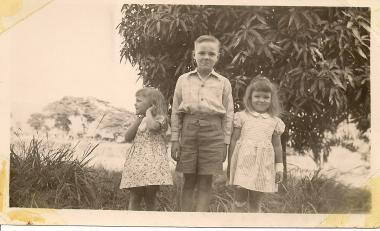When my big brother Cal was home from boarding school, my younger sister Marlowe and I enjoyed playing ‘pretend’ in very creative ways. Being quite young when we’d left the USA for Tanganyika, our memories of America were dim at best. I recall wearing hats and carrying a small American flag, marching around our house and pretending we were part of a big parade. We strutted about in line trying to be Boy Scouts. We had no audience, just our active imaginations. We marched and saluted in our humble ‘uniforms.’
On another occasion we became royalty, wearing old sheer curtains as our flowing robes and using sticks for scepters, graced with paper stars. We wore home-made paper crowns decorated with anything that resembled gems or jewels, just like the monarchs from the British Empire.
These wonderful times of simply playing make-believe transported us to realms far beyond the challenging reality of our lives as missionary kids in Tanganyika. We lived a simple life, depending daily on God’s provision, which sometimes came to the door as a bag of eggs or a ‘fresh’ jug of milk. Exchanging such necessities with our African neighbors introduced us to the kindness of the local people we had come to befriend.
African children came to play and joined our happy parades. We shared and learned from each other what it meant to be true friends. My sister Marlowe and I always carried our dollies on our backs wrapped with a kanga, a small cloth, just like the African mamas.
Pith helmets were a required item of dress in those days (1940s) to protect against the tropical sun and possible sunstroke. If our parents caught us without our helmets, they spanked us and after that we rarely forgot to don those bulky helmets, which sheltered us from Africa’s scorching sun.
The simplicity of our make-believe play has sadly been replaced with technical devices for today’s children. I think this restricts the active imagination of a child’s mind. I’m so grateful for the fun and freedom we enjoyed as youngsters playing pretend in the great outdoors in Tanganika’s tawny plains and rocky outcrops.


Recent Comments